Imagine you’re struggling with stress and fatigue, and you turn to Chinese medicine for relief. You’re introduced to adaptogens, a group of herbs revered for their ability to help the body resist stressors of all kinds, physical, chemical, or biological.
As you explore these natural remedies, you’ll find that adaptogens like Ginseng and Astragalus have been used for centuries to enhance stamina and resilience. However, it’s important to remember that these herbs are powerful, and we must tailor their use to your individual needs.
You may wonder which popular adaptogens are right for you and how they can be integrated into your lifestyle to promote balance and health. In the following conversation, you’ll discover how to navigate the complexities of these ancient herbs and their role in modern wellness, ensuring you harness their benefits while respecting their potency.
Key Takeaways
- Adaptogens are highly regarded in traditional Chinese medicine for their ability to help the body adapt to stress.
- They work by modulating the body’s physical stress response and restoring balance and harmony.
- Adaptogens have been scientifically proven to boost the immune system, enhance resistance to chronic stress, and increase energy levels.
- However, it is important to consult with a healthcare professional before integrating adaptogens into your routine, as they can interact with medications and may not be suitable for everyone.
Understanding Adaptogens
To truly harness the potential of adaptogens, you’ll need to appreciate how these natural allies work with your body to restore balance and resilience against symptoms of stress. In the realm of traditional Chinese medicine, adaptogens are known as herbal medicine powerhouses that help the body adapt to various environmental factors, ensuring your systems maintain equilibrium. These unique substances have a remarkable capacity to modulate your stress response, bolstering your body’s defences.
Adaptogens act as bio-regulators, gently guiding different tissues and organs towards a state of homeostasis—a fancy term for optimal functioning. Whether you’re grappling with adrenal fatigue, elevated cortisol levels, arthritis, or sleep disturbances, adaptogens have specific applications to support you through these conditions. They activate a range of responses that enable you to cope with different stressors, improving your energy circulation.
The power of adaptogens lies in their ability to strengthen what’s weak and calm what’s overactive. By aligning with the principles of traditional Chinese medicine, adaptogens offer a tailored approach to health, ensuring you’re not just throwing a generic solution at a complex problem. When used wisely, they’re a safe and effective way to enhance your well-being.

What Are Adaptogens and What Do They Do
You might be curious about adaptogenic properties, nature’s way of bolstering your body’s resilience to stress.
These powerful herbs work to restore balance in your system, aiming to harmonise your body’s response to external pressures and internal imbalances.
Supporting the benefits of adaptogens, there’s a growing body of science backing their ability to enhance well-being and mitigate the effects of stress.
Adaptogens Work On The Principle of Restoring Balance
Adaptogens function as nature’s meticulous balancers, working within your body to fine-tune its response to stressful situations and restore a state of equilibrium.
Imagine your body as a complex network, constantly interacting with various stressors. Adaptogens, deeply rooted in herbalism, support your body’s journey back to homeostasis—the optimal state where all systems are in balance.
They don’t just shield you from the immediate impact of emotional and mental stress; they also enhance your resilience.
As you incorporate adaptogens into your health routine, remember they’re more than a quick fix—they’re partners in your long-term wellness.
Approach them with respect, considering your unique health circumstances, and they’ll work harmoniously to gently nudge your body back to its natural state of well-being.
Is there any science behind the efficacy of adaptogens?
Often, when delving into the realm of herbal remedies, you might wonder whether there’s substantial scientific proof supporting the effectiveness of adaptogens for long-term stress relief and well-being. Clinical trials and studies on adaptogens have been promising, though are still evolving. These natural substances are renowned for their potential to mitigate the physiological effects of stress, helping to normalise functions like cortisol production, which is your body’s primary biological stress hormone.
Here’s a snapshot of science-backed adaptogens:
Ashwagandha
Reduces cortisol
May ease stress
Rhodiola Rosea
Enhances energy
Fights chronic fatigue
Ginseng
Boosts performance
Mental and physical
Holy Basil
Promotes relaxation
Anxiety management
Maca Root
Balances hormones
Supports endocrine health
When Chineses herbs are used in eastern medicine, they aren’t utilised in isolation but as a part of traditional medicine formulas. Always remember to consult with a qualified healthcare provider to ensure safety and proper use.
What happens when you take adaptogens
While scientific studies have highlighted the potential benefits of adaptogens, you might wonder exactly how these natural aids work within your body when you use them. Adaptogens help the body adapt to stress by modulating your response to stress, which can make managing stress easier. They support your body’s ability to cope with environmental and emotional stressors, aiming to restore balance and reduce the harmful effects of stress.
- Balance: Adaptogens work to restore equilibrium within your body, aiding in the maintenance of homeostasis.
- Enhancing resistance to stress: These natural allies improve your body’s response to physical, environmental, and emotional stress, potentially feeling stronger and more capable.
- Boosting your immune system: Adaptogens can help strengthen your entire body’s defences, making you less susceptible to illness and viral infections.
- Calm: Experience a calming effect that can soothe your mind and ease anxiety symptoms
- Supporting vitality: They can increase your energy levels and overall sense of resilience, assisting in recovery from fatigue, aiding you in tackling your daily challenges with renewed vigor.
Potential Risks and Side Effects of Adaptogenic Herbs
While adaptogens offer a range of positive effects on health, it’s essential to be aware of potential risks and adverse effects. If you’re considering these herbal supplements, remember they can interact with medications you’re already taking and may not be suitable for everyone.
Before you integrate adaptogens into your routine, it’s important to consult with a healthcare professional to ensure they’re a safe choice for you.
What to consider before taking adaptogens
Derived from traditional medicine, including Chinese herbal medicine, adaptogen herbs are well known for their balancing effects. While adaptogens are often sought to combat adrenal fatigue or anxiety disorders, their use isn’t free from potential side effects. It’s crucial to approach these natural stimulants with the same caution as any other remedy.
- Overstimulation: In certain cases, adaptogens can exacerbate anxiety or lead to restlessness. Those prone to manic episodes or hyperactivity might find some adaptogens exacerbate these conditions.
- Interactions with Medication: Some adaptogens may amplify or weaken the effects of prescription drugs, particularly psychoactive ones.
- Blood Pressure Concerns: Individuals with hypertension should use adaptogens cautiously, as they can affect blood pressure.
- Dosage and Source Verification: Unregulated products can carry risks, so it’s essential to choose reputable sources and adhere to recommended dosages.
Always consult with a healthcare provider to navigate these risks safely.
What are the side effects of adaptogens?
Often, the pursuit of well-being through natural means leads individuals to explore adaptogens, yet it’s crucial to understand that these herbs can come with unexpected side effects. While you seek to help your body adapt to stress, remember that herbal adaptogens can affect everyone differently. Here’s a concise table outlining potential side effects:
| Adaptogen | Possible Side Effects | Considerations |
|---|---|---|
| Ginseng | Insomnia, headaches | Monitor usage |
| Rhodiola | Dizziness, dry mouth | Stay hydrated |
| Ashwagandha | Stomach upset | Eat beforehand |
| Holy Basil | Blood thinning | Check with doctor if on medication |
| Licorice | High blood pressure | Limit duration |
As you can see, adaptogens work in complex ways, and their interactions with the human body’s unique chemistry are important to consider. Always prioritize safety and consult with a healthcare provider.
Adaptogens can interact with your medications
Before adding adaptogens to your daily regimen, it’s essential to consider how they might interact with medications you’re currently taking. As powerful components of herbal medicine, particularly in Chinese medicine, adaptogens often have profound effects on your body’s systems. Interactions with your Western medicine can sometimes lead to unexpected and potentially harmful consequences.
- Blood thinners: Adaptogens like ginseng may increase bleeding risk.
- Diabetes medication: Some adaptogens can affect blood sugar levels.
- Immune suppressants: Certain adaptogens might stimulate the immune system.
- Sedatives: Herbal remedies may enhance sedative effects.
It’s crucial to engage with healthcare professionals who understand both your medications and the potential effects of adaptogens. Safeguard your health by ensuring that you’re informed and cautious when integrating these powerful herbs into your life.
Who should avoid adaptogens
While adaptogens offer many health benefits, it’s crucial to recognize that they’re not suitable for everyone and may pose risks for certain individuals.
If you’re pregnant or breastfeeding, avoid adaptogens because of potential risks to the fetus or infant.
Those with autoimmune diseases should also approach adaptogens with caution, as they can stimulate the immune system, possibly exacerbating your condition.
If you have hormone-sensitive conditions such as breast or ovarian cancer, or uterine fibroids, steer clear of adaptogens because of their possible estrogenic effects.
Always consider any allergies to specific herbs, and if you’re managing underlying health conditions or taking prescription medications, it’s essential to consult a healthcare professional to sidestep medication interactions or health complications.
How do I take adaptogens?
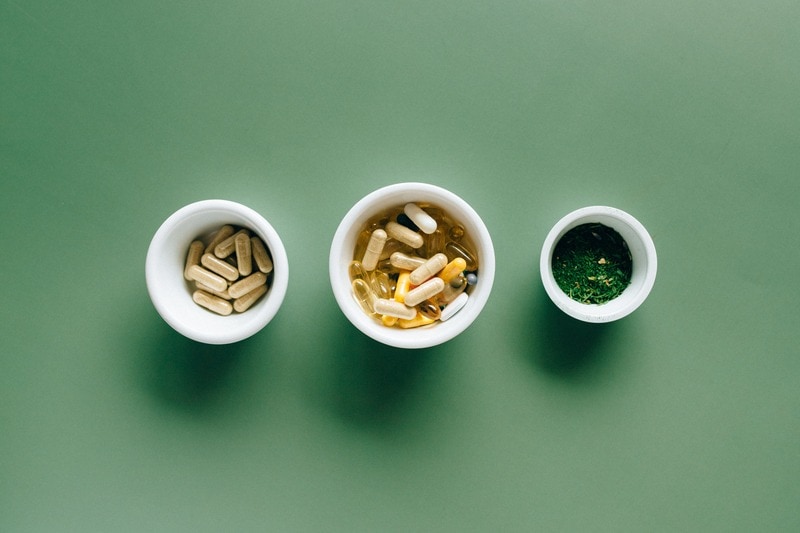
You’re considering integrating adaptogens into your routine to harness their balancing effects on your body’s stress response.
They come in various forms, such as tablets, tinctures, or even blended into nourishing drinks, allowing you to choose what best fits your lifestyle.
Before starting, it’s crucial to consult with a healthcare professional to ensure they’re appropriate for your specific health conditions and won’t interact with any medications you’re taking.
How do you add adaptogens to your diet?
Incorporating adaptogens into your diet can enhance your well-being, and it’s as simple as adding a spoonful of herbal powder to your morning smoothie or sipping on an adaptogenic tea throughout the day. These potent herbs from Chinese herbal medicine are held in high esteem for their ability to balance your food energy and support resilience to stress.
- Embrace the power of nature by mixing a tincture of adaptogens into your water or juice, fostering a sense of harmony within.
- Stir adaptogenic powders into oatmeal or yogurt to start your day with a grounding, nourishing boost.
- Discover the tranquility of adaptogen-infused teas, a gentle reminder to pause and care for your body and spirit.
- Explore capsules and tablets as a convenient addition to your diet, ensuring consistent support for your dynamic lifestyle.
How Plant Adaptogens are Used in Traditional Chinese Medicine
You may have heard about the role common adaptogens play in Traditional Chinese Medicine (TCM). These medicinal herbs, including Ginseng and Schisandra, are integrated into treatments to bolster your health and vitality.
It’s crucial to approach them with respect and understanding, as they carry potent properties that can harmonise with your body’s unique needs when used appropriately.
Is ashwagandha used in Chinese medicine?
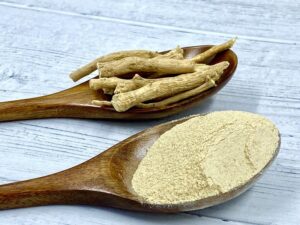
In recent years, there has been a surge of interest in holistic health practices and traditional medicine. One herb that has gained significant attention is ashwagandha, which holds a prominent position in Ayurvedic Medicine. However, when exploring the realms of Chinese medicine, it becomes apparent that ashwagandha does not feature prominently in this ancient healing system. Instead, Chinese medicine has its own array of adaptogenic herbs that are traditionally used to promote balance and well-being.
While ashwagandha may not be as well-known or widely used in Chinese medicine, it’s important to recognize that different ancient healing systems have their own unique and valuable contributions to offer. Practices and herbs from Ayurvedic Medicine, Traditional Chinese Medicine, and other holistic traditions can all play a role in supporting overall health and well-being. It’s valuable to explore and learn from the diverse perspectives and practices that different traditions offer. This can help us gain a more comprehensive understanding of health and wellness, and provide us with a wider range of tools and resources for supporting our overall well-being.
Ginseng in Chinese Medicine

Harnessing the ancient wisdom of Chinese medicine, Asian ginseng, or ‘Ren Shen’, serves as a cornerstone adaptogen for boosting your immune system and revitalizing the body’s energy. As a potent tonic herb in Chinese herbal medicine, panax ginseng is used for its ability to harmonise the body’s vital energies (Qi) and is widely used in traditional Chinese medicine.
Imagine feeling a natural surge of vitality, as panax ginseng fuels your body’s resilience.
Envision your immune system fortified, safeguarded by the protective embrace of this ancient herb.
Feel the gentle power of a tonic crafted from centuries-old knowledge, tailored to nurture your well-being.
Trust in a remedy that’s withstood the test of time, ensuring you’re supported by the strength of tradition.
In your quest for health, let ginseng’s legacy empower you.
Schisandra’s Health Benefits

Amidst the pantheon of adaptogenic herbs in traditional Chinese medicine, Schisandra (Wu Wei Zi) stands out as a multifaceted ally, nurturing your body’s ability to cope with stress and bolstering overall vitality. Schisandra chinensis, known for its antioxidant properties, tirelessly works to protect your cardiovascular system.
As an adaptogenic herb, it’s a beacon of support when you’re grappling with fatigue, offering a sustainable boost to your natural energy levels.
Moreover, Schisandra’s influence extends to your immune system and digestion, fortifying your defenses and enhancing bodily harmony. Such benefits are rooted in the traditional Chinese medicinal practice of tonifying Qi, particularly within your kidneys.
Licorice Root Uses

While Schisandra supports your body’s stress response and vitality, licorice root, or Gan Cao, offers its own adaptogenic strengths in Traditional Chinese Medicine by enhancing digestive health and soothing respiratory concerns. This cherished element of Chinese herbal medicine serves as a guardian of your gastrointestinal tract, wielding its anti-inflammatory prowess.
Consider these licorice root uses to nurture your well-being:
- Alleviates digestive discomfort, fostering a sense of internal calm and resilience.
- Eases respiratory ailments, allowing you to breathe deeply and freely.
- Harmonizes body systems, promoting a synergy that resonates with balance and health.
- Soothes overworked adrenal glands, providing a restorative embrace to your stress response mechanisms.
Reishi Mushroom Properties

Delving into the heart of Traditional Chinese Medicine, you’ll discover that Reishi mushroom, or Ling Zhi, is utilised for its ability to bolster your immune system and enhance tranquility, making it a cornerstone among adaptogenic herbs. This medicinal mushroom not only supports your immune system but also benefits lung health, contributing to your overall well-being and quality of life.
In the realm of Chinese herbalism, Reishi is used to tonify Qi, the vital energy that sustains life and promotes health. Its calming properties can help you find a sense of peace in your daily life, often serving as a wholesome substitute for coffee.
As you incorporate Reishi into your routine, it’s important to respect its strength and adaptogenic nature, ensuring it aligns with your body’s needs and supports your journey toward balance and health.
Cordyceps for Vitality
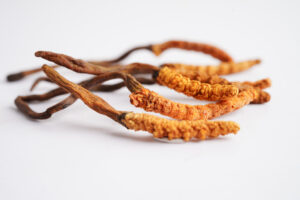
Building on the immune-enhancing properties of Reishi mushrooms, Cordyceps (Dong Chong Xia Cao) similarly offers a boost to vitality, serving as a cornerstone herb in Traditional Chinese Medicine to invigorate the body and combat stress. As an adaptogenic fungus, Cordyceps is known for its ability to strengthen the body’s intrinsic energy, supporting you in your quest for a balanced and energized life.
- Cordyceps empowers you to rise above fatigue, renewing your zest for life.
- Feel the boost of your natural resilience against the demands of a hectic world.
- Revel in the newfound vitality as your body and mind harmonize.
- Trust in the adaptogenic wisdom of ancient practices to nurture your well-being.
Rhodiola’s Therapeutic Effects

Rhodiola (Hong Jing Tian), an adaptogen in Traditional Chinese Medicine, offers you relief from stress and bolsters your body’s resilience to external pressures.
This powerful herb enhances your mental and physical performance, allowing you to confront life’s challenges with greater vigor.
Rhodiola specifically targets your body’s nervous system, regulating it to reduce stress and anxiety while promoting a harmonious balance among your organs.
Turmeric’s Healing Powers
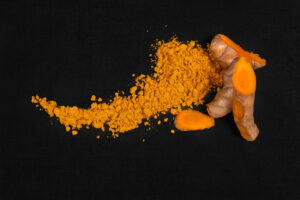
Just as Rhodiola helps you combat stress, turmeric, another esteemed adaptogen in Chinese medicine, offers potent anti-inflammatory benefits, supporting your journey towards better health. This golden spice, used in both Chinese herbal medicine and ayurvedic traditions, wields healing powers that have been trusted for centuries.
Turmeric (Jiang Huang) can be your ally in the fight against inflammation, offering relief and hope. Its ability to enhance circulation whispers promises of vitality and less pain.
Envision turmeric boosting immune function and shielding your cells from the threat of cancer with its preventative qualities. Feel the warmth of safety, knowing turmeric supports cognitive health, guarding against diseases like Alzheimer’s.
Ginkgo Biloba’s Role
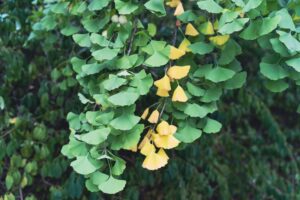
Bai Dao, also known as Ginkgo Biloba, an esteemed adaptogen in traditional Chinese medicine, enhances circulation and cognitive function, offering a venerable approach to holistic health. It’s revered for its ability to support the brain and central nervous system, making it a go-to for those seeking to boost memory and mental clarity. Ginkgo Biloba’s role extends to the immune system, safeguarding your body’s resilience against memory-related conditions.
As you integrate adaptogens like Ginkgo Biloba into your wellness routine, remember to do so with care. It’s about nurturing your health safely, ensuring that each step you take is in harmony with your unique physiological needs. Trust in the wisdom of traditional Chinese medicine to guide you toward a balanced, strengthened state of well-being.
Conclusion
As you dip your toes into the ocean of Chinese medicine, remember that natural adaptogens are allies, not magic bullets. They’re tools to help you weather life’s storms, but we must wield them with wisdom.
Embrace them with an understanding heart, and they could be the wind in your sails, guiding you toward balance and vitality. Just be sure to navigate their use with care, listening to your body and seeking guidance when needed.
Your journey to wellness is uniquely yours.



